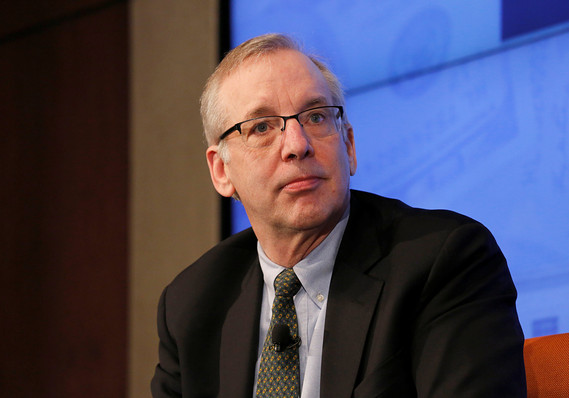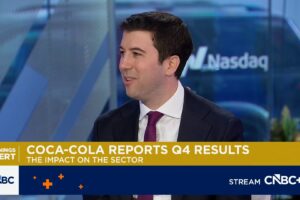 Reuters
Reuters
There are times when the Federal Reserve has been accused of acting politically. For example, in 2016 Donald Trump chastised Fed Chairwoman Janet Yellen for holding interest rates low to help President Barack Obama.
Never, as far as I can tell, has a policy maker, current or former, encouraged the Fed to take overt political action. But that’s exactly what former New York Fed President Bill Dudley did in a Bloomberg column on Tuesday.
Dudley writes:
“U.S. President Donald Trump’s trade war with China keeps undermining the confidence of businesses and consumers, worsening the economic outlook. This manufactured disaster-in-the-making presents the Federal Reserve with a dilemma: Should it mitigate the damage by providing offsetting stimulus, or refuse to play along?”
“If the ultimate goal is a healthy economy, the Fed should seriously consider the latter approach,” he concludes.
Not only does Dudley suggest that the Fed make clear that it will not use monetary policy to counteract any adverse effect from Trump’s trade war, but he also implies that in resisting the temptation to lower rates, the Fed could — and should — reduce Trump’s chances of re-election.
“I understand and support Fed officials’ desire to remain apolitical,” Dudley writes. “But Trump’s ongoing attacks on Powell and on the institution have made that untenable. Central bank officials face a choice: enable the Trump administration to continue down a disastrous path of trade war escalation, or send a clear signal that if the administration does so, the president, not the Fed, will bear the risks — including the risk of losing the next election.”
Remember what your parents told you? Two wrongs don’t make a right.
Just because Trump has broken with decades of precedent by criticizing the Fed for not lowering rates aggressively, calling Powell “clueless,” and threatening to replace his hand-picked chairman is no justification for the Fed to respond in kind.
Such an overt act to affect an election outcome would set a very bad precedent.
If the Fed is to function unfettered by political interference, the central bank cannot initiate political action of its own, refraining from lowering rates to punish a president or easing needlessly to give the economy a boost to assist in a president’s re-election.
What’s more, to the extent that the Fed relies on “forward guidance” as a policy tool — communicating its intentions for the benchmark rate in order to influence market rates — who would trust what policy makers say if they were to extend their sphere of influence to presidential elections?
Fed Chair Jerome Powell’s address in Jackson Hole last Friday is already providing fodder for some who see the Fed as playing politics with Trump.
The economy is in a good place, but we’ve got this trade policy uncertainty, not to mention the knock-on effects from the trade war to contend with, Powell seemed to be saying. And there are “no recent precedents to guide any policy response,” he said. Monetary policy “cannot provide a settled rulebook for international trade.”
In other words, it’s not our fault if something bad happens!
Never mind that there is no settled rulebook for the myriad of crises the Fed has faced over the years, from the savings and loan crisis to the subprime lending crisis to wars to government shutdowns. The Fed has learned (hopefully) over the years which type of crisis merits an easing of monetary policy and which ones don’t.
Take the 1970s oil shock, for example. When a reduction in the supply of oil — expressed as an inward shift of the supply curve — leads to a higher price CL.1, +1.40% and a lower quantity demanded, the appropriate response is not an easing of monetary policy.
Monetary policy affects aggregate demand. It has no effect on aggregate supply. Try as it might, the Fed cannot prod Saudi Arabia to pump more oil. So easing into a negative supply shock increases the demand for a limited supply of, in this case, oil, the effect of which is to raise oil prices and eventually overall inflation.
Tariffs, like all taxes, have the effect of raising prices and lowering output. In other words, they constitute a negative supply shock.
In quantitative terms, the current tariffs are not large enough to tip the economy into recession or cause a significant spike in inflation, which, based upon what the Fed has been saying, wouldn’t be so terrible after seven years of undershooting its 2% target.
But the tariffs and uncertainty over trade policy are having a dampening effect on demand at a time when global growth is already slowing. Trump’s shoot-from-the-hip trade policy has hurt business confidence and depressed capital investment. So there is a demand-side element to the slowdown as well, which monetary policy is well-suited to address.
It is hard to fathom what Dudley was thinking in advocating such an off-the-wall idea of factoring political outcomes into policy decisions. The Fed has a dual mandate from Congress to promote maximum employment and price stability. There is nothing in that mandate, or in the Federal Reserve Act, about influencing election outcomes. Nothing in there either about being part of “the Resistance” to this president.
That would be a dangerous expansion of Federal Reserve’s operating framework.
Trump may be a threat to the nation and to the post-World War II order, and his constant bashing of the Fed may be beyond the pale. But tit-for-tat monetary policy is not the solution.










